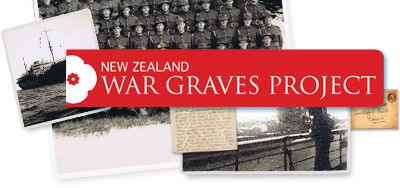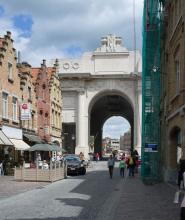Remains of World War I captain Henry John Innes Walker discovered in Flanders field
“[Captain Henry] Walker, an Aucklander who had joined the British Army and rose to become a captain with the Royal Warwickshire Regiment's 1st Battalion, was killed in action on April 25, 1915 - at around the time the Anzacs landed several hundred kilometres away at Gallipoli.”
He was shot in the stomach at about 3.30am as his company advanced to take a defended wooded area.
Official UK war documents from the time state that Walker's body was last seen lying in a large shell crater, about 45m from a German trench. Comrades of Walker believed that the enemy would "probably" have buried him in the "natural grave" of the shell crater.His remains have just been uncovered as part of a dig forming a TV series, In War Special: Among Flemish Fields, Belgian news outlet HLN reports.” [New Zealand Herald, 30 August 2016] At the time of writing a search was underway for surviving relatives with a view to finding a final resting place for him. In due course the New Zealand War Graves Trust will photograph his grave. [NZWGT - 22 October 2016]
“NEW ZEALAND OFFICER'S END. (By Telegraph—Press Association.) Auckland, April 29. News has been received in Auckland of the death of Captain H. J. I. Walker, son of Mr. and Mrs. Henry C. H. Walker, of Remuera. The text of the telegram from the Secretary of State for War is as follows: —"Deeply regret Captain Walker, 1st Royal Warwickshire Regiment, killed in action, April 25. Lord Kitchener expresses sympathy." Advice was received on January 22 that Lieutenant Walker had been promoted to the rank of captain. His name was mentioned in dispatches the following month, for "gallantry and distinguished service in the field." Captain Walker was 25 years of age.” [Dominion, Volume 8, Issue 2449, 30 April 1915 p4]
“News was received to-day of the death of Captain J. Walker, eldest son of Mr. and Mrs. H. C. H. Walker, of Victoria Avenue, Remuera. A brief official message from the War Office conveyed the information that Captain Walker had been killed in action. Beyond this intimation the sorrowing parents have no news of the fate of their son, but it is believed that he has been killed while on active service in Flanders, where he had been engaged in the very thickest of the fighting since the commencement of the war. Captain Walker, it will be remembered, was reported amongst the missing after the famous retreat from Mons, during the first weeks of the war. For quite a considerable period his relatives were in suspense, and it was not until a cable arrived from the officer himself, announcing that he was safe and well, that the minds of his parents were relieved. In letters subsequently published in these columns, Captain Walker explained how in the great retreat he and others became separated from their regiment, and were for several days in dire straits, though subsequently enabled to rejoin without having sustained serious mishap. In subsequent letters, which were also published, he described life (in the trenches, seven hundred yards of which, at one of the most important points in Flanders, were entrusted to his direct safe-keeping. In still later letters, Captain Walker described the delights of a ten days' holiday in England; how, in less than 20 hours, he had travelled from the trenches in France to London itself, and of how wonderful it all seemed to leave the sleet and snow, after months of fighting, and suddenly find himself in a private home, amongst friends, with the opportunities for having warm baths and well-cooked meals. On the last occasion that he wrote, Captain Walker declared that although they were going through the rigours of a severe winter campaign, he was feeling perfectly fit and well. Captain Walker, who was only 25 years of age was an old King's College boy, and a remarkable fine athlete. He qualified by examination some years ago for a commission in the British Army, and after service in India, proceeded to England. He was attached to the Warwickshires throughout the fighting in Belgium and France, and was regarded as an exceedingly gifted and efficient officer. The keenest sympathy will be felt with Mr. and Mrs. Walker in their great loss.” [Auckland Star, Volume XLVI, Issue 101, 29 April 1915 p6]
“Captain Henry Innes Walker, a New Zealander in the Warwickshires, was killed in action. Capt. Walker was a son of Mr and Mrs H. C. H. Walker, of Remuera, Auckland. Both as an athlete and soldier Captain Walker had a distinguished career. A prominent ex-student of King's College (Auckland); he was one of the mainstays of the first fifteen, and held the senior athletic champion when only 16 years of age. He left the college in 1909, continuing his studies for his army entrance examination under the guidance of his old tutors. About five years ago he was given a second lieutenant's commission. Almost immediately he left for India to join the Royal Warwickshire Regiment. During the 15 months he spent in India he took a prominent part in sports gatherings, and was amateur hurdle champion of India. When the Warwickshires were ordered back to England, Captain Walker, who had qualified for his commission as a first lieutenant, but who was still junior subaltern, accompanied them. After arrival in England he secured promotion to a senior lieutenancy. His prowess on the football field is testified to by the fact that he played in the senior team of the famous Blackheath Club and secured representative honours in the Kent fifteen. At the army sports in 1913 he won no fewer than six cups. As a hockey player he took part in the final for the army championship. It was mainly due to his powers as a sprinter and hurdler that the Warwickshires won the regimental championship in the Eastern Command sports last year, since, of their total of 12 points, he scored 9¾ . After war was declared the Warwickshires, who were at Hythe, left for the front. The regiment arrived in France on August 23 and a few days later the young New Zealander saw active service on the Belgian frontier. Advice was received on January 22 that Lieutenant Walker had been promoted to the rank of captain. His name was mentioned in despatches the following month for ''gallantry and distinguished service in the field." Captain Walker was 25 years of age.” [Manawatu Standard, Volume XLI, Issue 10061, 4 May 1915 p7]



